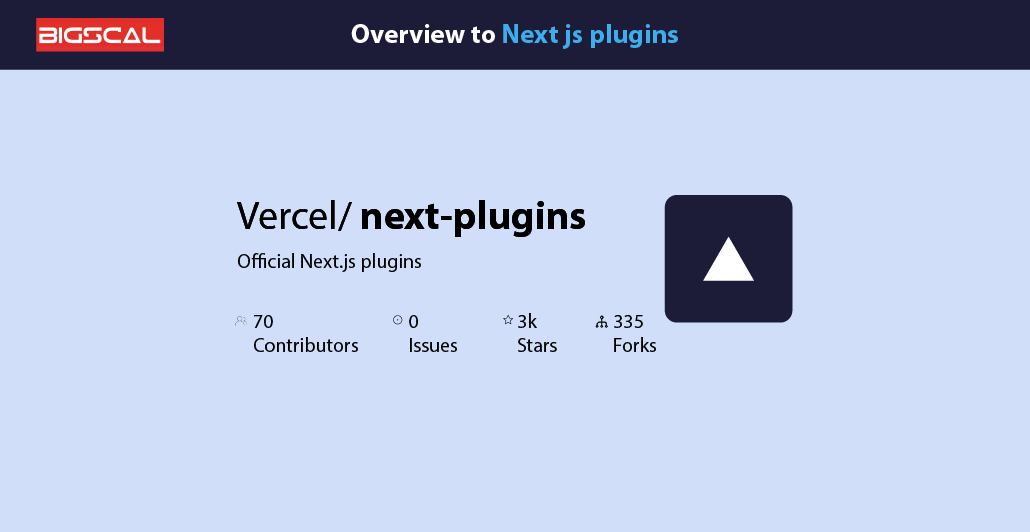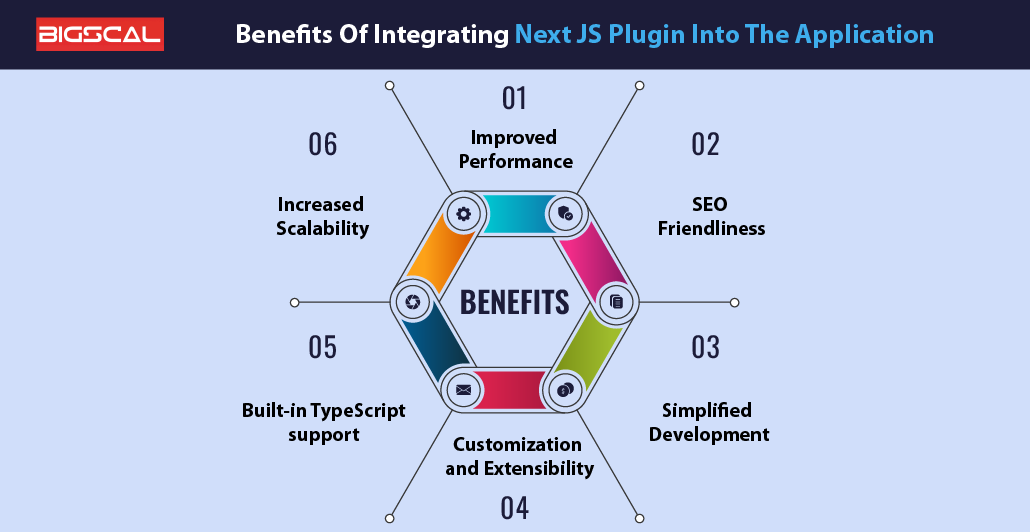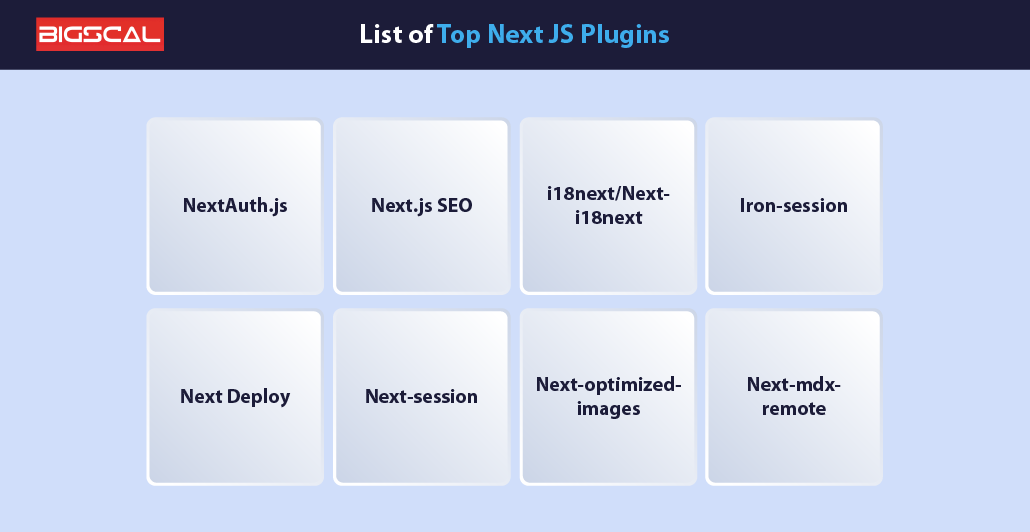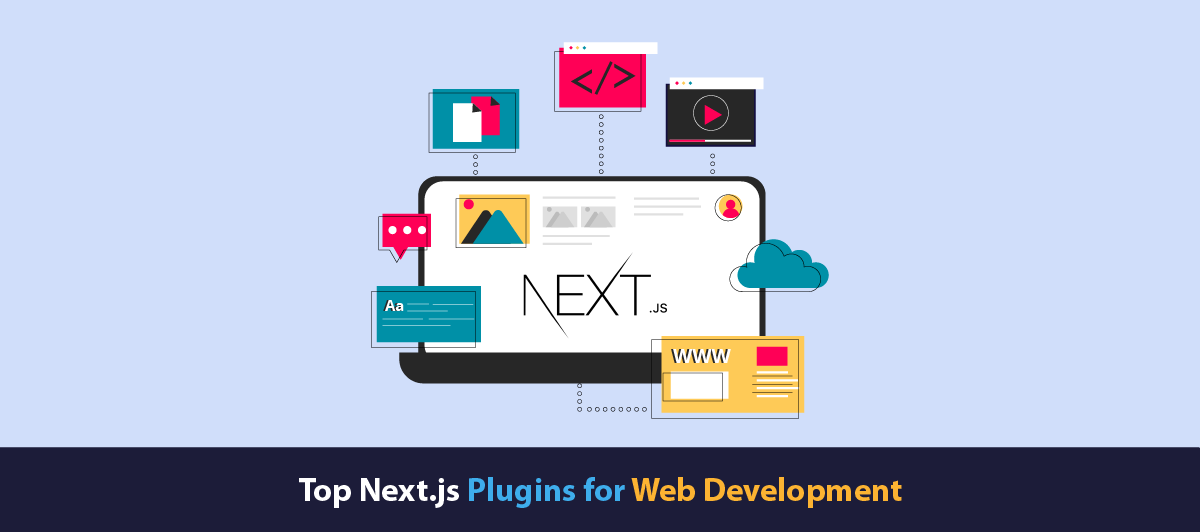Top 8 Must Have Next.js Plugins To Enhance Web Development
Quick Summary: Are you considering Next.JS for your web development project? If yes then you must know about the Next.js Plugins that will help you to elevate your web app. But which are those plugins and how can you know about and install them? Read this article as we will explain to you about those next compose plugins!
Introduction
Next.JS, a React framework, is consistently a top choice for developers. It’s ecosystem is continue evolving by including various Next.JS plugins. So, if you are considering it for your project then you must know the details about these plugins.
Although, Next.Js, with its seamless integration of React and server-side rendering, has already established itself as a powerhouse in the web development. But why settle for the basics when you can enhance your capabilities with these essential plugins?
So, we will gonna discuss about these top plugins which help you to transform your development workflow. Supercharge your projects with increased performance and efficiency.
Read on!
Overview to Next JS plugins

Next.js plugins are modular extensions that enhance the capabilities and functionality of your Next.js application. These are the tools that enhance the capacity of Next.js apps and help to elevate the web app. It makes the development faster, smoother, and more efficient.
With an ever-expanding Next.JS ecosystem, the plugins provides developers to seamlessly integrate new features and functionalities into their projects with minimal effort.
Therefore, the plugins are the tools that allows you to add SEO optimization, internationalization, or authentication to your application with just a few lines of code. In addition, these plugins streamline common development tasks. Moreover, Next.js plugins promote collaboration and code reusability within the developer community.
Benefits Of Integrating Next JS Plugin Into The Application
Integrating plugins into your Next.js apps offers various benefits and these are as follows:

Improved Performance
Next.js plugins use server-side rendering (SSR) and automatic code splitting. This results in faster page load times and improved performance. With the pre-rendering process for pages during development, this plugins helps to reduces the burden on the client side. Hence, it again results for smoother user experiences.
SEO Friendliness
The Plugins package for Next.JS improves SEO. As it use server-side rendering or static site generation. It ensures that search engines crawl your website seamlessly. Additionally, this can enable search better engine rankings and increased organic traffic.
Simplified development
Next JS plugins can simplify complex tasks by providing pre-built solutions to common challenges. For instance, plugins for internationalization (i18n), authentication, and strategy can simplify development. As it download boilerplate code remotely. This reduces the need for manual configuration.
Additionally, it streamline development by providing a robust ecosystem of tools, libraries and utilities. These plugins often automate common tasks, such as code splitting, routing, and server-side rendering, reducing development time and complexity. Furthermore, it offer extensive documentation and support. This enables developers to easily troubleshoot issues and integrate new Next.JS Features seamlessly into their projects.
Customization and Extensibility
Next.js plugins are typically designed to be highly customizable and extensible. It allows developers to customize them as per the need. This can save time and effort compared to building a custom solution from scratch.
Built-in TypeScript support
Next.js has built-in TypeScript support, and many plugins are also written in TypeScript, for stronger typing and improved developer productivity This can help catch bugs earlier in the development process and improve your codebase over time.
Increased scalability
Plugins can help improve the scalability of your application. Plugins provide features such as automatic code partitioning, which can split your code into smaller bundles that can be deployed asynchronously. This can help reduce time the first load on a page to improve the performance of your application, especially as a complexity increase.
List of Top Next JS Plugins
Here’s the list of top plugins for Next.js:

NextAuth.js
NextAuth.js is a powerful authentication library for Next.JS applications. It simplifies the implementation of authentication features. These features are user registration, login, and session management. It supports a variety of authentication services including OAuth, JWT, and traditional email/password authentication.
Main Advantages and Features of NextAuth.js plugin is:
- It typically either its simplicity of or lack of any integration. Developers should not bother into the low-content trust protocols complexity; they can add authentication feature into their Next.js applications very easily.
- NextAuth.js implements multiple providers of authentication build-ins. Enables developers to specify whether authentication is only given to those who choose the method rather than rely on the default.
- In session management, that it has. With that moreover it provides session management, and performs session maintenance operations as sessions are created & terminated. This is an ever assuring authentication facility for users because it ensures a safe and seamless process.
- NextAuth.js has a flexible, log in system of which developers might modify the logging into approach based upon application’s requirements. It could set up hooks and callbacks that would allow users to alter different stages of authentication like looking up the user profile or split sessions.
Next.js SEO
Along with other plugins, a older version or Latest Version of Next.js has a collection of SEO plugins and tools aimed at improving the search engine optimization (SEO) capabilities of Next.js applications. SEO is essential to ensure that websites rank first in search engine results, which drives organic traffic to the website. Next.js SEO plugins address various aspects of SEO optimization. This includes metadata management, organized data symbols, and performance optimization.
Main Advantages and Features of Next.js SEO plugin:
- These plugins handle metadata efficiently. Next.js SEO plugins provide tools to dynamically generate metadata based on page content, and enable web pages to be found in search results.
- Next.js SEO plugins make it easy to use structured data markup, such as JSON-LD schemas. Structured data markup helps search engines better understand the content of web pages. It increases search engine visibility and providing rich search results, such as rich snippets and knowledge panels.
- Next.js SEO plugins have tools to optimize SEO aspects of performance. Like pageload speed and mobile friendliness.
- These plugins offer features such as high-performance graphics, lazy loading, and responsive design. This ensures that web pages meet performance standards set by search engines for optimal ranking.
i18next/Next-i18next
Next-i18next is a powerful plugin that internationalizes Next.js applications. By seamlessly integrating server-side rendering (SSR) into this international network, developers can easily create multilingual websites without compromising performance or SEO
Main Advantages and Features of Next-i18next SEO plugin:
- Next-i18next allows developers to define translations for different languages via JSON files or babelrc file. This makes it easier to manage and manage translations for different parts of the application.
- Next-i18next supports dynamic routing. It provides URLs translated for different languages while maintaining a consistent user experience. This ensures that users can access the site seamlessly regardless of their preferred language.
- It provides excellent support for both server-side and client-side rendering. This ensures that rendered text is properly presented to users, regardless of their browsing status.
- Next-i18next simplifies the complex internationalization of Next.js applications. It gives developers a solution for multilingual websites.
Iron-session
Iron-session is a secure session plugin for Next.js applications. It provides a simple yet effective way to manage session data securely. The use of iron sessions allows developers to more efficiently store session data in the cache than cookies. Therefore, it reduces security vulnerabilities commonly associated with client-side storage.
Main Advantages and Features of iron-session SEO plugin:
- It has encryption abilities. It uses industry-standard algorithms to encrypt session data. This ensures that sensitive information remains safe from unauthorized access or tampering.
- Iron-session provides configurable options for session completion. It enables developers to define custom session lifecycles based on their application needs.
- Iron-session integrates seamlessly with Next.js applications by default, requiring minimal config to get started.
Next Deploy
The Next Deploy plugin designed to streamline the deployment process of Next.js applications. It offers a convenient solution for deploying Next.js projects to various hosting platforms in UK with minimal configuration
Main Advantages and Features Next Deploy plugin:
- This plugin automates many deployment tasks, such as creating a project for production upgrading assets. By adding Next Deploy to your workflow, you can save the time and effort you would have to manually set up deployment.
- It has compatibility with popular hosting services like Vercel, Netlify, and AWS Amplify.
- Next Deploy provides support for dynamic environments. It enables developers to manage multiple configured settings for development, staging, and production environments.
- Next Deploy enhances the deployment experience for Next.js developers by automating the deployment process.
Next-session
Next-session is a plugin for Next.js that simplifies session management in server-side rendered (SSR) React applications. Consistency is an important aspect of web development. It allows applications to maintain status information between multiple requests from a single user.
Main Advantages and Features Next-session plugin:
- This plugin removes many of the complexities of session management. And it provides developers with an intuitive API to handle session-related tasks.
- It support for various session storage options. This include in-memory storage, cookie-based storage, and external storage providers like Redis.
- Next-session next export also provides built-in middleware to integrate session management into application methods.
- It provides support for session timeout. This ensures that sessions are automatically terminated after a specified period of inactivity.
Next-optimized-images
This plugin improves image management, optimized performance and user experience. It integrates seamlessly with your Next.js project. Additionally, it provides a simple solution for image quality. This plugin optimizes images during compression, reduces file size, and improves loading speed without compromising quality.
Main Advantages and Features Next-optimized-images plugin:
- Through modern image optimization techniques. For example, like lazy loading and responsive image generation, Next-optimized images ensure your web application loads faster.
- It supports a variety of image types and resolutions.
- This allows you to deliver the best possible experience across devices and screen sizes.
- Using Next-optimized-images, you can easily manage images in your Next.js project without worrying about manual optimization or performance bottlenecks.
- This plugin helps you to simplifies image editing, helping you deliver a faster, more responsive experience for any type of application.
Next-mdx-remote
Another useful plugin is Next-mdx-remote. It allows you to easily present MDX (Markdown and JSX) content in your Next.js application. With MDX you can embed JSX components directly into your Markdown documents. This provides the best way to create dynamic and interactive content.
Main Advantages and Features Next-optimized-images plugin:
- With Next-mdx-remote, you can effortlessly add MDX content to your Next.js projects.
- This plugin handles the parsing and rendering of MDX content during development. And it provides high-quality HTML output that can be quickly served to clients.
- It supports SSR and SSG, this allows you to pre-define MDX content for SEO and improved performance. Provides the flexibility to configure layouts and syntax. This allows you to customize the rendering settings according to the needs of your project.
- Next-mdx-remote empowers you to use the flexibility of MDX in your Next.js applications. It enables you to create rich, interactive content that connects with your audience.
Integrate Next.JS Plugins Seamlessly With Bigscal Technologies
You might be seeking technical assistance to integrate Next.js plugins! If so, then Bigscal Technologies is an ultimate choice for you!
At Bigscal Technologies, we prioritize easy integration of Next.js plugins to improve the of web applications. By seamlessly integrating these plugins into our projects, we can optimize their features without compromising the stability or scalability of applications.
This approach allows us to extend the capabilities of Next.js while maintaining code cleanliness and structure. Furthermore, seamless integration reduces the risk of conflicts or compatibility issues. It results in a more smooth development and implementation process. Moreover, with all these services we can ensure to deliver the best application.
So, contact us now!
Conclusion
Installing Next.js plugin on your web development tools can significantly increase the quality of your projects. We have already discussed about these plugins in this blog. These plugins accelerate development cycles. It also ensure scalability and maintainability for projects of any size. So, if you are considering Next.js for your project then this plugins would really helpful for you.
FAQ
Is Next.js faster than React?
Next.js is built on top of React and optimizes server rendering and other performance aspects. Potentially making it faster to load and render web pages compared to using React alone.
Is Next.js still using Webpack?
Yes, Next.js still uses Webpack as its default build tool for bundling assets and optimizing performance. It provide a seamless development experience for building React applications.
Can I use Next.js without React?
No, Next.js is tightly integrated with React. It’s built to enhance React applications with features like server-side rendering, routing, and more.
Which is most used Next compose plugins for packages?
Some popular Next.js plugins for package management include next-compose-plugins, @next/bundle-analyzer, and next-transpile-modules. They enhance functionality and optimize performance for Next.js applications.
Plugin for routing in Next.JS?
For routing in Next.js, you can use the built-in next/router module, which provides client-side routing capabilities, allowing you to navigate between pages and manage application URLs effortlessly.





